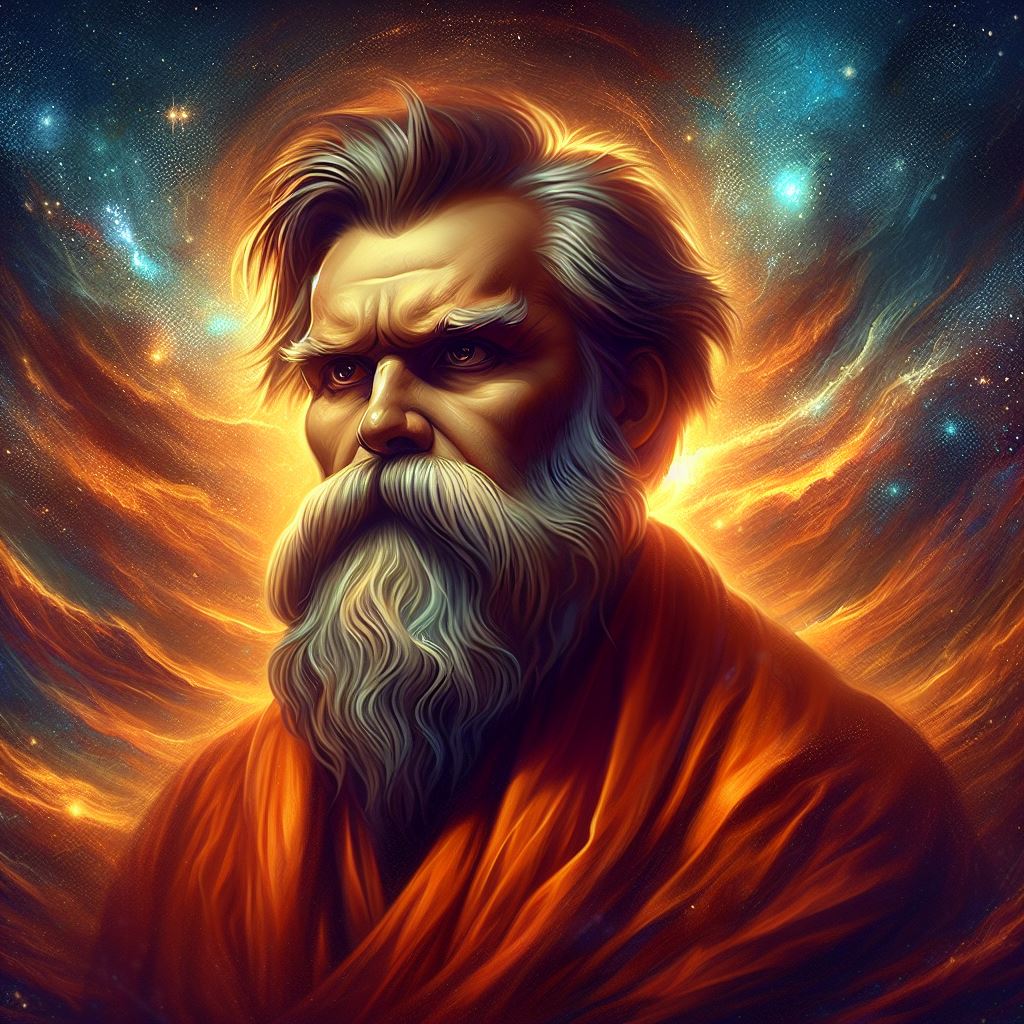
“Thus Spoke Zarathustra” is a philosophical novel written by Friedrich Nietzsche, first published in 1883. It follows the journey and teachings of the character Zarathustra, who presents his ideas on the nature of existence, morality, and the human condition.
In Nietzsche’s Magnum Opus, ‘Thus Spake Zarathustra,’ the character of the saint is one who has dedicated the entirety of his existence to God. The saint is depicted as a hermit who has spent his life in solitude, contemplating the divine. When Zarathustra encounters the saint, he initially mistakes him for a wild animal due to his dishevelled appearance. However, as they converse, Zarathustra learns about the saint’s spiritual journey and his disillusionment with traditional religious beliefs and is shocked, hadn’t the Saint heard that God is Dead?
In Thus Spake Zarathustra, the character of the saint represents the conventional moral values and religious beliefs of Christian Europe that Nietzsche decries as ‘herd morality,’ the collective self-interest of groups, fraternities, societies, communities, and nations that stifle the self-interest of individuals in order to benefit the majority. Such herd morality is for Nietzsche symbolic of weakness, weakness of spirit, weakness of soul because it is inhibiting to the Will to Power, the blind and relentless driving force behind all of life’s interactions. All living things possess a share of the Will to Power, when it’s discharged good feelings abound, when it’s hindered sadness, melancholy, depression, and despair can often follow. For Nietzsche a good life is one in which one’s own Will to Power is expressed fully and without hindrance and in order for this to happen one must break away from the morality of the herd.
Mythopoetic Style
Nietzsche wrote ‘Thus Spake Zarathustra,’ in a mythopoetic style, that blended storytelling, poetic impulses, and philosophical nuance into a body of work that is often difficult to follow. It can’t be read quickly, each and every line must be digested slowly and considered apart from all others whilst at the same time a part of the whole. Thus, it can be said that when you read ‘Thus Spake Zarathustra,’ you, the reader, are left to encounter the language and symbolism of Nietzsche’s mind. In a Jungian sense you are getting a glimpse into the unconscious contents of Nietzsche’s mind now made conscious in print. Thus, the book becomes a description of Nietzsche’s philosophy at its most mature in a form that’s often raw, bewildering, and chocked full of hidden meanings and revelations that tug at your subconscious mind, begging themselves to be brought to consciousness.
As far as Nietzsche is concerned humanity is at a pivotal moment. Will humanity transcend its present limits, will this be the age of the overman, the liberated individual free from the herd morality of crowds, political movements, religious affiliations and as such able to forge their own values and henceforth live their lives authentically, or will it be instead the age of the last man, the end point of human evolution who lives only for comfort and ease of existence? That’s the fundamental question that Nietzsche poses to us in Thus Spake Zarathustra, are we ready to be over-men, do we have it within us to rise to greatness or will we shrink away from such manifest destiny to become the last man, the man whose sole aim is comfort and ease, the man who shrinks away from risk and danger, adversity, or challenge.
The Character of the Saint.
The Saint is depicted as someone who renounces worldly pleasures and comforts in pursuit of spiritual purity and redemption. To Nietzsche such actions are misguided and ultimately nihilistic because they deny life’s inherent value and beauty.
A person who renounces the world and its pleasures in favour of asceticism and self-denial, can’t be anything other than a nihilist, should they believe that true redemption lies in the rejection of earthly desires and pursuits. By devaluing life in favour of some abstract notion of purity or transcendence, the saint essentially rejects the richness and complexity of human experience. This, according to Nietzsche, ultimately leads to a sense of meaninglessness and despair. Meaning cannot be found in this world, so they make for themselves the existence of another world to be the source of meaning. By placing ultimate meaning and purpose outside of the tangible world, the saint overlooks the potential to create meaning through individual will and creativity.
By contrasting the saint with Zarathustra, Nietzsche aims to highlight the limitations of traditional morality and advocate for a re-evaluation of values based on individual will and creativity. Zarathustra, as Nietzsche’s protagonist, embodies the concept of the “overman” or “superman,” who embraces life fully and creates his own values beyond good and evil. Thus, the saint serves as a foil to Zarathustra, representing the old moral order that must be overcome in the pursuit of self-realization and personal growth.
In conclusion, Nietzsche portrays the saint’s worldview as nihilistic because it denies the inherent value of life and seeks meaning in transcendental ideals, leading to a sense of emptiness and despair. Nietzsche’s critique serves as a call to embrace life fully and create meaning on one’s own terms, rather than succumbing to nihilism through the rejection of worldly existence.

